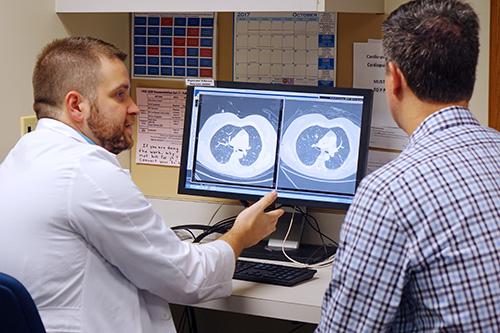Research
 Participating in a meaningful research project is a critical component of our fellowship training program. We offer our fellows a broad range of research opportunities, spanning the spectrum from basic science to translational and clinical outcomes research.
Participating in a meaningful research project is a critical component of our fellowship training program. We offer our fellows a broad range of research opportunities, spanning the spectrum from basic science to translational and clinical outcomes research.
Our Division Faculty have extensive experience in mentoring M.D. fellows, helping them to develop individualized training plans in order to ensure a successful research experience. Additional oversight is provided by the Research Advisory Council (RAC), which meets regularly with our trainees to help trouble-shoot, provide career advice, and verify that milestones are met.
The Process
Fellows are expected to identify a research project and mentor during their first year of clinical training. Our fellows can draw from a broad range of projects and faculty, and are guided through the process by Fellowship Program directors.
Research starts in earnest during the second year, when fellows are afforded 9-18 months of protected time to complete their projects. Fellows interested in a more intensive experience, with additional protected time for research, can be accommodated with support of the Pulmonary T32 Training Grant (see below).
Quality Improvement
All fellows take part in a longitudinal Quality Improvement project, working with two of their colleagues to design, develop, and implement real-time quality improvement measures. Each group generates their own focused aim based on the specific outcomes they identify as in need of improvement. QI teams will introduce and test changes designed to achieve the improvement aims using successive Plan Do Study Act (PDSA) cycles until they arrive on a change that is ready for implementation and dissemination.
Program Faculty
Our Division Faculty include internationally recognized experts in the fields of asthma immunology, pulmonary hypertension, pulmonary fibrosis, air pollution, critical care outcomes, and chronic lung inflammation. We work closely with the Lung Biology and Disease Program, which is comprised of more than 30 faculty members conducting research related to pulmonary medicine and lung biology. A wealth of additional research opportunities are available in the Department of Medicine. Resources are available for conducting drug discovery research. Fellows interested in clinical outcomes and epidemiology research can work with expert mentors based in the Clinical and Translational Science Institute.
Keys to success
A successful fellowship research project requires passion and commitment, from both the trainee and the research mentor. An important first step is to define a specific question that is timely, important, and can be answered in the time frame available. We recognize that many of our M.D. fellows have not had extensive research experience, and it can be challenging to learn the new language and approaches needed. Fortunately, we have decades of experience with mentoring our fellows and helping them navigate this process.
Expectations
By the end of the research component of their fellowship, our goal is for fellows to have sufficient data to submit a first-authored manuscript for publication in a peer-reviewed journal. All first-year fellows are sponsored to attend the annual meeting of the American College of Chest Physicians (CHEST) meeting. Senior fellows are expected to present their research at any of the CHEST, American Thoracic Society, or Society of Critical Care Medicine annual meetings. During their research training, fellows are expected to attend the bi-weekly Lung Biology Research Seminar and present a poster at the annual Lung Biology Research Trainee Day.
Pulmonary T32 Training Grant
The Division is the proud home of the Multidisciplinary Training in Pulmonary Research T32 training grant. This Institutional National Research Service Award is designed to develop skilled investigators with research-oriented careers directed at solving basic and clinical problems in lung disease. The T32 P.I. is Dr. Steve Georas, and co-P.I. is Dr. Michael O’Reilly (Director, Lung Biology Program).
The Pulmonary T32 supports four pre-doctoral students and four post-doctoral trainees annually, and has been continually funded for more than 30 years. The T32 can support another year of protected time for M.D. fellows interested in pursuing a research project in depth. If you are interested in this option, please let us know at the time of your interview.
Whatever the project chosen, we make sure Fellows have sufficient oversight and mentorship so that they can get the most out of their chosen projects.”